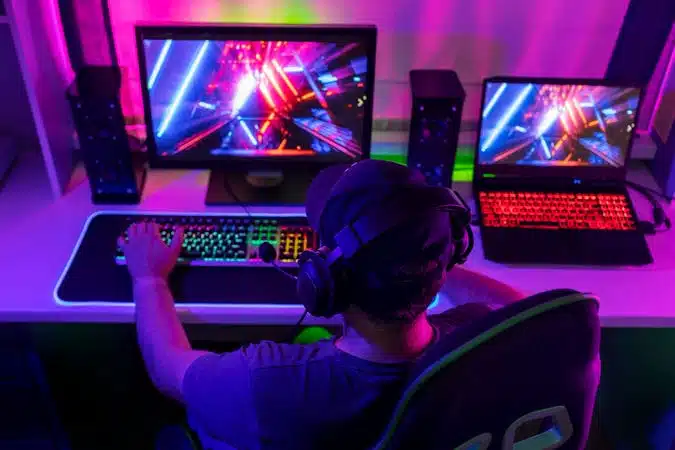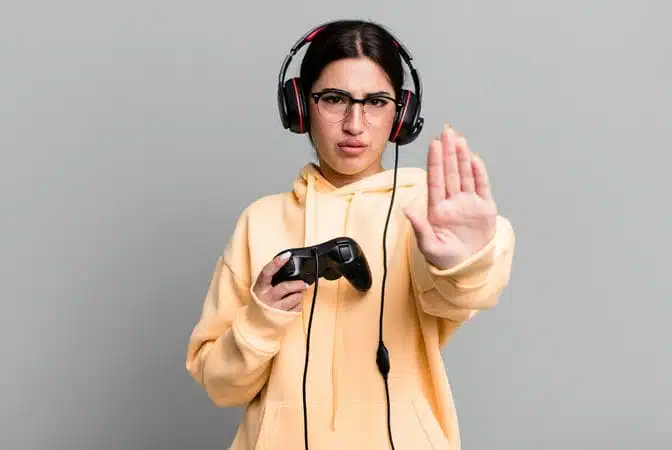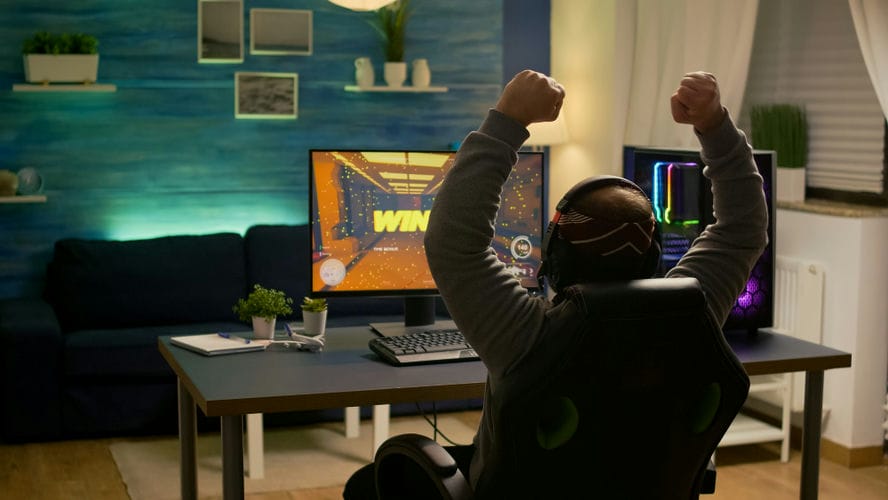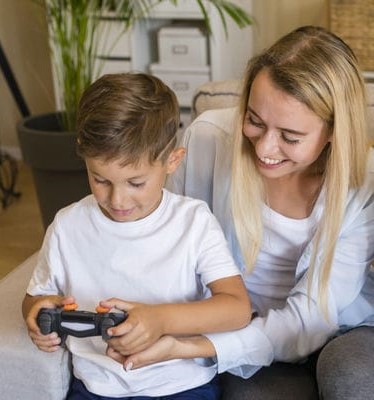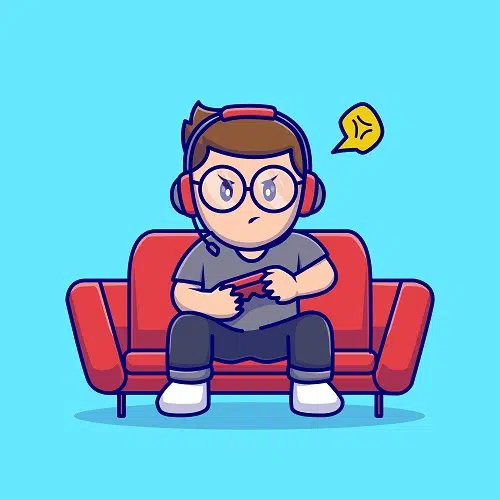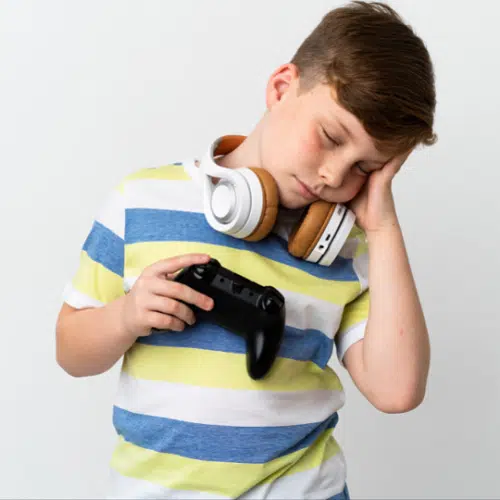A study from Oxford University shows that video game playing can help improve eyesight, develops reading skills in dyslexic kids, and may help to receive pain. However, too much playing may affect temperament and decrease a child’s socialization.
Research suggests that children should play video games for one hour or less per day. That time may be adjusted for non-school days. Boundaries are important and should be individualized for each child and gaming activity should always be monitored.
Most parents question the effects of gaming and struggle to set boundaries. This article will explore healthy timeframes for gaming, behavioral warning signs, and when to reassess limits.
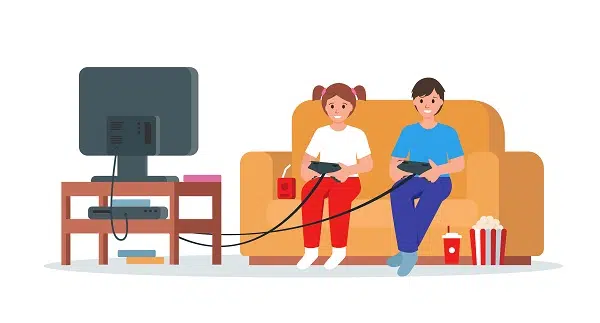
How Many Hours a Day Should a Child Play Video Games?
In a University of Michigan poll, 90% of parents say their kids spend too much time gaming. Fifty-four percent of those parents reported more than 3 hours of gameplay per day. Many parents struggle with the question, how much is too much when it comes to video games?
Most experts agree that less than 1 hour of video game play per school day (and no more than 2 hours on non-school days) leads to more social and satisfied children. After school playing has even been proven to relieve stress and improve mood. However, playing before bed causes rapid declines in sleep quality and productivity among children.
Many of the same experts even recommend cutting out video games completely at least one day per week. Others suggest allowing 30 minutes of gaming before responsibilities and exercise and saving the rest of the set time for after. This encourages creativity, exercise, the pursuit of other hobbies, and socialization with friends.
Excess gaming can cause serious problems for children including sleep deprivation, mood swings, obesity, and exposure to inappropriate content.
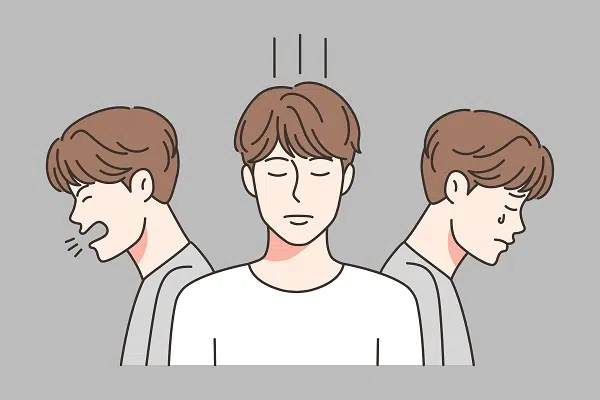
Keep an Eye out for Trouble
Children (and adults) require balance and boundaries with any activity. Be aware of the following warning signs when setting time limits for video game playing. Some problems are harder to spot than others so it is critical to monitor your child’s behavior when assessing any activities.
If a child shows a significant change in academic performance or socialization, it may be an effect of isolation or distraction due to video game playing. You may also notice emotional disconnection. These behaviors may be a sign of video game addiction or distraction.
You should also keep an eye on your child’s online relationships. Many kids play video games with others online. However, it is important to know the effect these relationships can have on your child. As a parent, you have a responsibility to help children avoid predators and unhealthy attachments.

Your Child’s Health
Warning signs are not only behavioral and may include physical changes. Childhood obesity and depression are among the top medical concerns worldwide. While not a direct result of video game playing, lack of physical activity is a contributing factor. Sudden weight gain and clinical depression may indicate a need for change.
Playing video games before bed or late into the night often leads to a lack of sleep. Memory loss, trouble concentrating, high blood pressure, and weakened immunity are all effects of sleep deprivation. These symptoms are cause for heightened concern among children.
Exercise is an important deterrent to each of these problems. It is recommended that children ages 6 to 17 require an hour of physical activity a day to strengthen bones and build muscle mass. Some experts suggest allowing video gameplay after children are active.

Age Matters
It is also important to remember that physical and behavioral stages differ with age. For most children, experts suggest 30 to 60 minutes of video gameplay on school days. On non-school days, this can be increased to 2 hours, provided that other responsibilities are not neglected.
This number changes significantly for kids under 6-years-old. The American Academy of Pediatrics highly recommends limiting screentime for young children to less than one hour a day. Some pediatricians and health experts push even lower to less than 30 minutes a day.
It is important to note that screen time is not the only concern, content is also a factor to consider. A parent must ask, can my child process that information they are receiving while gaming? Are the graphics too violent or sexual for their developmental stage?
Once a determination about the amount of time playing a video game has been made, it is important to evaluate the effectiveness of those boundaries.
Time to Reassess
The needs of a child change over time. With this in mind, it is important to reassess the video game time limit boundaries often. A child may earn more playtime by following the rules and managing responsibilities well. If they are struggling, you might need to set new boundaries.
This assessment should take place every one to two months. You should take the time to have an open and honest conversation with your child about their gaming habits, behavior, and physical and mental health.
Remember that it is easier to loosen restrictions than to tighten them. Set clear, defined boundaries. You can increase time and allow for more adult content as your child proves they are ready.

Setting Boundaries
You know the recommendations, and you’ve taken the time to assess your child’s needs. Now you face a new challenge, setting healthy boundaries.
The best way to help your child understand guidelines is to make them clear and identifiable. They should be able to answer two questions: What is expected? What are the consequences if I don’t meet those expectations?
Make Responsibilities a Priority
Gaming is a recreational activity. Children need to understand that responsibilities come first according to the Child Mind Institute. Making a list of the tasks that need to be completed before gaming begins can help children learn to manage priorities in a healthy way.
These tasks often include household chores and caring for pets. Other examples may include personal health and hygiene requirements. Homework is another priority on a child’s checklist. Once they are completed, then children are allowed to play video games.

Alternative Activities
If a child loves video games, it can be beneficial to find activities that match their interests. This can help encourage kids to get involved with other pursuits.
If a child enjoys Minecraft™, you might help them find creative projects like robotics or puzzles. A recreational sports league might be a great fit for kids who enjoy Fifa™ or Madden™. An alternative for role-playing games might include a Dungeons & Dragons™ or competitive activity.
These activities can help promote physical activity and socialization while still engaging a child’s interests.
Family Time
Families should set aside time for video game free mealtimes and bonding according to experts. This will encourage healthy conversations and socialization.
Gaming with your children is another way to build boundaries. This allows you to bond while monitoring the amount of time and the content of your child’s gaming.

Consequences
Boundaries are ineffective without consequences. There are several options for managing expectations and each family must establish its guidelines. A few examples include:
- Every minute of gaming that goes over the set time limits removes one minute of play from the next day.
- Game consoles should be kept in common areas of the house to help monitor activity.
- Phone and computer apps can be used to monitor video game playing time and online activity.
Conclusion
Children should not spend an unmonitored amount of time playing video games. Too much gaming can lead to harmful repercussions. It is important to manage the amount of time kids spend gaming with clear boundaries and expectations.














